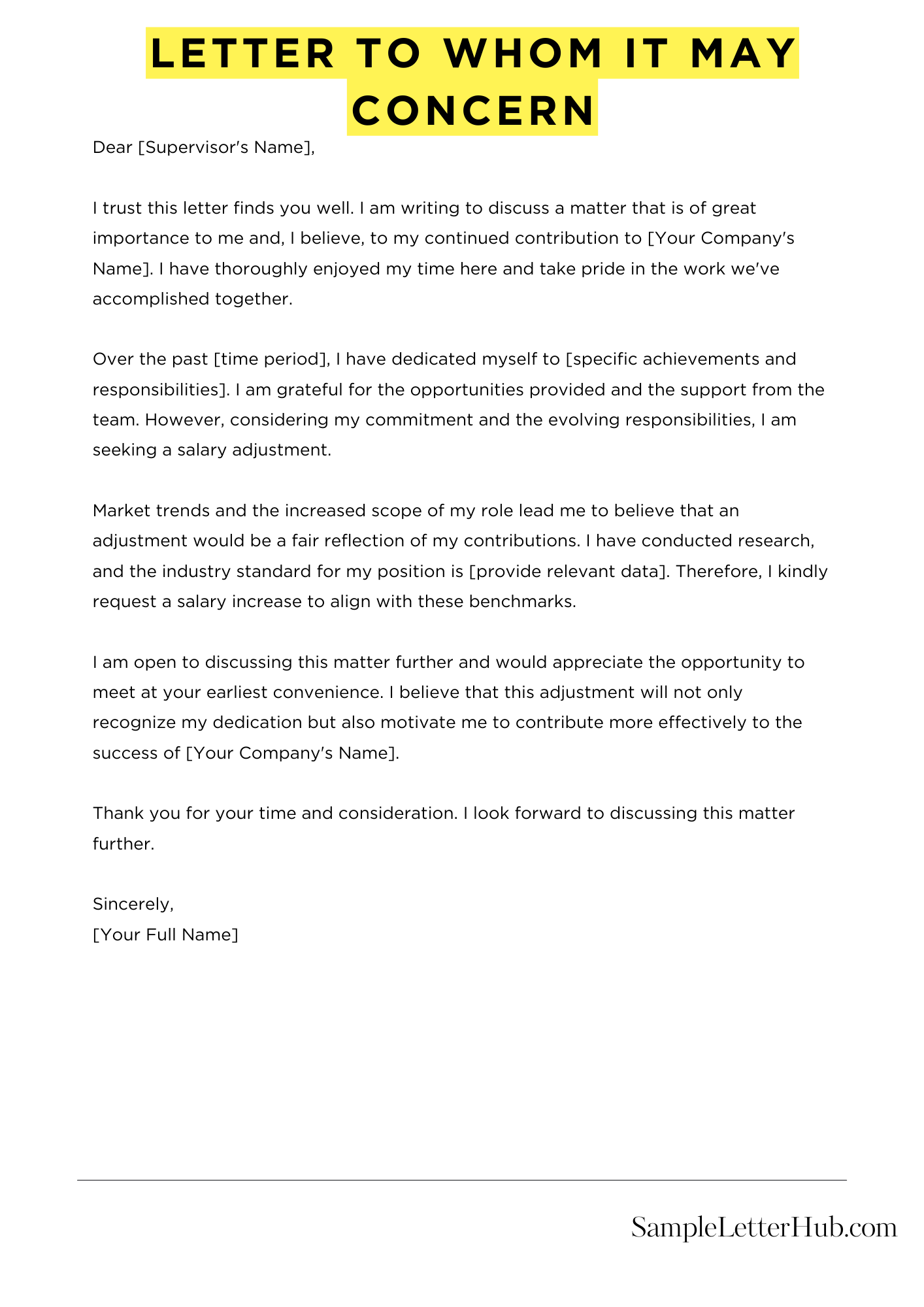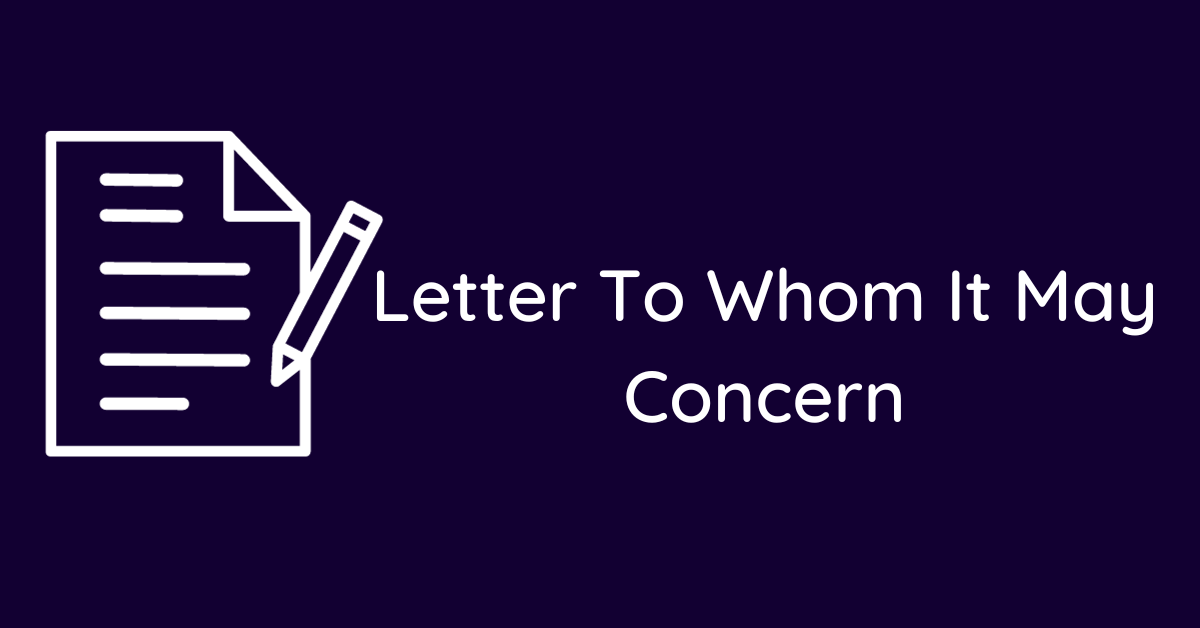Are you struggling to address a letter to someone whose name you don’t know? Look no further than the “”Letter To Whom It May Concern.””
This type of letter is used when you need to address a recipient but don’t have their name or contact information. It’s a formal way to begin a letter and is commonly used in business and professional settings.
In this blog article, we will provide you with templates, examples, and samples of “”Letter To Whom It May Concern.””
Our goal is to make it easy for you to write any letter that you need to write. Whether you’re applying for a job, requesting a reference, or seeking information, we’ve got you covered. With our helpful resources, you’ll be able to craft a professional and effective letter in no time.
So, if you’re feeling stuck or unsure about how to address a letter, don’t worry. We’ve got everything you need to get started.
Keep reading to learn more about “”Letter To Whom It May Concern”” and how to use it in your own correspondence.
Letter To Whom It May Concern
Dear Sir/Madam,
I trust this letter finds you well. I am writing to inform you about [briefly describe the purpose or subject of the letter].
This communication serves to [provide information, request assistance, etc.], and I am confident that your attention to this matter will be greatly appreciated.
[Additional details or specifics relevant to the letter’s purpose can be included here.]
If you require any further information or clarification, please do not hesitate to contact me at [Your Contact Information].
Your prompt attention to this matter is highly valued. Thank you for your time and consideration.
Sincerely,
[Your Full Name]
Business Letter To Whom It May Concern
Dear Sir/Madam,
I am writing to bring to your attention [briefly describe the purpose or subject of the letter]. As we embark on [specific project or initiative], we believe that your involvement and expertise would greatly contribute to its success.
The [project/initiative] is aimed at [describe the goals and objectives], and we are confident that your insights and skills align perfectly with the requirements of this endeavor. Your reputation in the industry precedes you, and we value the potential collaboration with someone of your caliber.
[Additional details or specifics relevant to the business matter can be included here.]
If you are interested or require further information, please do not hesitate to contact us at [Your Contact Information]. Your consideration of this matter is highly appreciated, and we look forward to the possibility of working together.
Thank you for your time and attention.
Sincerely,
[Your Full Name]
Recommendation Letter To Whom It May Concern
Dear Sir/Madam,
It is my pleasure to write this letter of recommendation for [Name], whom I have had the privilege of working with for the past [number of years or months].
[Name] has consistently demonstrated exceptional [skills/qualities] during our time together. Their dedication, attention to detail, and ability to [specific achievements or tasks] have set them apart. Moreover, their positive attitude and strong work ethic make them a valuable asset to any team.
One particular instance that stands out is [cite an example of a significant accomplishment or project]. [Name]’s ability to [highlight a specific skill or attribute] was crucial to the success of this initiative.
I am confident that [Name] will excel in any endeavor they choose to pursue. Their passion for [industry or field] and commitment to excellence make them an ideal candidate for [specific opportunity].
If you require any additional information, please feel free to contact me at [Your Contact Information]. I wholeheartedly recommend [Name] and believe they will bring great value to any organization.
Sincerely,
[Your Full Name]
Formal Letter To Whom It May Concern
Dear Sir/Madam,
I am writing to bring to your attention [specific matter or issue] that requires careful consideration. It has come to our notice that [briefly describe the situation or problem].
[Provide any relevant details or background information here, supporting the purpose of the letter. Highlight key points that need attention and resolution.]
Furthermore, we kindly request that [specific action or resolution] be taken to address this matter promptly. Your cooperation in this regard is highly appreciated, and we believe that your involvement will contribute significantly to the resolution of [the issue].
If you require any additional information or clarification, please do not hesitate to contact us at [Your Contact Information]. We look forward to a timely and positive response to this matter.
Thank you for your attention and understanding.
Sincerely,
[Your Full Name]
To Whom It May Concern Resignation Letter
Dear Sir/Madam,
I am writing to formally submit my resignation from my position at [Company Name]. After careful consideration, I have decided that it is in the best interest of both parties to part ways.
I have thoroughly enjoyed my time working here and appreciate the opportunities for professional and personal development that the company has provided. However, after much reflection, I have decided to explore new challenges and opportunities that align more closely with my long-term career goals.
My last working day at [Company Name] will be [Last Working Day, typically two weeks from the date of the letter]. During this notice period, I am committed to ensuring a smooth transition and will be happy to assist in training a replacement or transferring my responsibilities to a designated colleague.
I would like to express my gratitude to the entire team for the support and camaraderie throughout my tenure. I have learned valuable skills and formed lasting connections that I will carry with me in my future endeavors.
Thank you for the opportunities, and I wish [Company Name] continued success in the future.
Sincerely,
[Your Full Name]

How to Write a Letter to Whom It May Concern
Writing a letter to whom it may concern can be a daunting task, especially if you are unsure of the recipient’s identity. However, with the right approach and a few key tips, you can craft a professional and effective letter that will get your message across. In this article, we will guide you through the process of writing a letter to whom it may concern, step by step.
1. Determine the Purpose of Your Letter
Before you begin writing, it is important to determine the purpose of your letter. Are you writing to request information, express a concern, or make a complaint? Knowing the purpose of your letter will help you to structure your message and ensure that you are addressing the appropriate recipient.
2. Research the Recipient
If possible, try to research the recipient of your letter. This will help you to address them by name, which is always more personal and professional than a generic greeting. If you are unable to determine the recipient’s name, you can still use “”To Whom It May Concern”” as a last resort.
3. Use a Professional Tone
When writing a letter to whom it may concern, it is important to use a professional tone. Avoid using slang or informal language, and be sure to proofread your letter for spelling and grammar errors. Remember, your letter is a reflection of you and your organization, so it is important to make a good impression.
4. State Your Purpose Clearly
In the opening paragraph of your letter, state your purpose clearly and concisely. This will help the recipient to understand the reason for your letter and what action, if any, is required on their part. Be sure to provide any necessary background information to support your request or concern.
5. Provide Supporting Evidence
If you are making a complaint or expressing a concern, it is important to provide supporting evidence to back up your claims. This could include copies of relevant documents, photographs, or witness statements. Be sure to clearly label any attachments and refer to them in your letter.
6. Close Your Letter Professionally
In the closing paragraph of your letter, thank the recipient for their time and consideration. Be sure to provide your contact information, including your name, address, and phone number, so that the recipient can follow up with you if necessary. Close your letter with a professional sign-off, such as “”Sincerely”” or “”Best regards.”
FAQs About Letter to Whom It May Concern
1. What is a “”Letter To Whom It May Concern””?
A “”Letter To Whom It May Concern”” is a formal letter that is used when the recipient of the letter is unknown. It is commonly used in situations where the letter is being sent to a company or organization, and the sender does not know the name of the person who will be receiving the letter.
2. When should I use a “”Letter To Whom It May Concern””?
A “”Letter To Whom It May Concern”” should be used when the recipient of the letter is unknown, and the sender does not have any other means of addressing the letter. It is commonly used in situations where the letter is being sent to a company or organization, and the sender does not know the name of the person who will be receiving the letter.
3. How should I address a “”Letter To Whom It May Concern””?
When addressing a “”Letter To Whom It May Concern””, it is important to use a formal tone and to address the letter to the appropriate department or organization. If possible, try to find out the name of the person who will be receiving the letter, and address the letter to them directly.
4. What should I include in a “”Letter To Whom It May Concern””?
A “”Letter To Whom It May Concern”” should include all of the necessary information that the recipient needs to know. This may include the purpose of the letter, any relevant details or information, and any requests or actions that need to be taken.
5. Can a “”Letter To Whom It May Concern”” be used in a job application?
Yes, a “”Letter To Whom It May Concern”” can be used in a job application. However, it is important to note that using a specific name or title in the letter may be more effective in making a good impression on the employer.
6. Is a “”Letter To Whom It May Concern”” considered formal or informal?
A “”Letter To Whom It May Concern”” is considered a formal letter. It is important to use a formal tone and to address the letter to the appropriate department or organization.
7. What are some common mistakes to avoid when writing a “”Letter To Whom It May Concern”””
“This response was truncated by the cut-off limit (max tokens). Open the sidebar, Increase the parameter in the settings and then regenerate.
Related:
- Letters To The President ( 5 Samples )
- Letter To The Bride Book ( 5 Samples )
- Authorization Letter To Bank ( 5 Samples )
- Day care Welcome Letter To Parents ( 5 Samples )
- Letter Of Appeal To Insurance ( 5 Samples )

